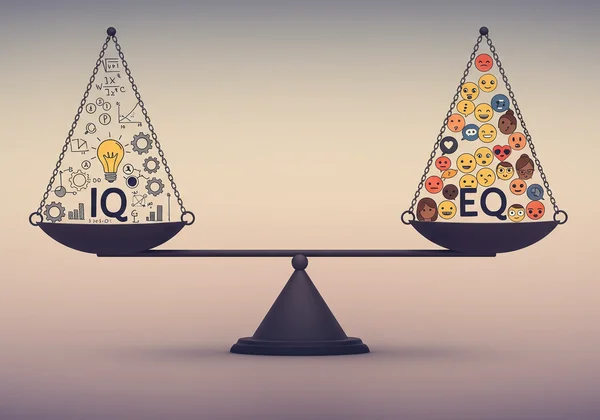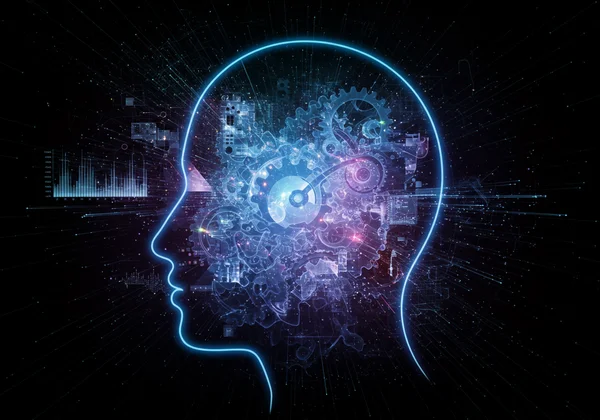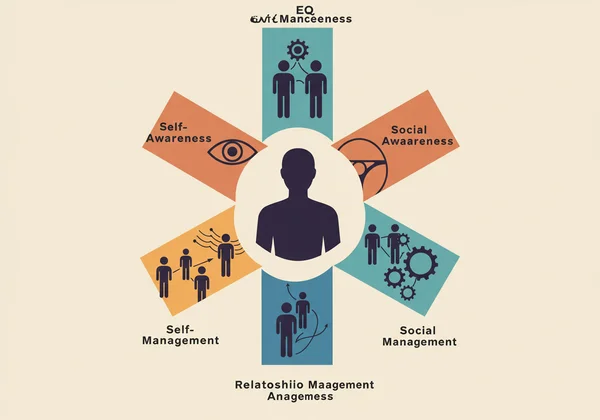IQ vs. EQ: Which Matters More for Success? Take Your EI Test
September 29, 2025 | By Evelyn Reed
Introduction: The IQ vs. EQ Debate for Modern Success and Emotional Intelligence
For decades, we’ve been fascinated by the concept of intelligence. We've heard stories of geniuses with sky-high IQs who changed the world, leading many to believe that cognitive ability is the ultimate key to success. But is that the whole picture? In a world that's more interconnected and collaborative than ever, another form of intelligence is taking center stage. This brings us to the great debate: IQ vs. EQ. What is the difference between IQ and EQ, and which one truly fuels a successful and fulfilling life?
The truth is, both matter, but their roles are distinct and often misunderstood. While IQ might get your foot in the door, it's your EQ that determines how you navigate the room, build relationships, and lead with impact. Understanding your unique emotional landscape is the crucial first step to unlocking your true potential. Are you ready to embark on that journey? You can begin right now by exploring an EI test today.

Defining Intelligence: Understanding IQ and Its Role in Cognitive Skills
When we talk about traditional intelligence, we're usually referring to the Intelligence Quotient, or IQ. It’s the measure that has long been the gold standard for assessing intellectual prowess, often associated with academic achievement and problem-solving capabilities.
The Traditional View: Cognitive Abilities and Analytical Prowess
At its core, IQ is a score derived from standardized tests designed to measure a person's cognitive abilities. These abilities include logical reasoning, spatial awareness, verbal comprehension, and mathematical skills. Think of it as the brain's raw processing power—the ability to learn, understand, and apply information to solve well-defined problems.
A high IQ often correlates with success in fields that demand rigorous analytical thought, such as science, engineering, and academia. It’s the engine that helps you process complex data, identify patterns, and develop logical strategies. However, it doesn't account for the human element of success—how we interact with others and manage ourselves.

How is IQ Measured? Understanding Standardized Tests
IQ is quantified through a series of standardized assessments that compare an individual's performance against a peer group. These tests present a variety of puzzles and questions that challenge your memory, vocabulary, and pattern recognition skills. The final score is a reflection of your ability to tackle these abstract challenges efficiently.
While these tests provide a useful snapshot of one's analytical horsepower, they don't capture the full spectrum of human intelligence. This is where Emotional Intelligence, or EQ, enters the conversation, offering a more holistic view of what it takes to thrive.
Unveiling Emotional Intelligence: What is EQ (Emotional Intelligence)?
If IQ is about how you process information, Emotional Quotient (EQ), or Emotional Intelligence (EI), is about how you process emotions—both your own and those of others. It’s the ability to perceive, use, understand, manage, and handle emotions. In essence, it's the "street smarts" that complement the "book smarts" of IQ.
The Four Pillars of Emotional Intelligence
Emotional intelligence is not a single skill but a combination of four crucial competencies that work in harmony. Renowned psychologist Daniel Goleman identified these as the four pillars:
-
Self-Awareness: This is the foundation. It's the ability to recognize and understand your own moods, emotions, and drives, as well as their effect on others. A person with high self-awareness knows their strengths and weaknesses and operates from a place of quiet confidence.
-
Self-Management (or Self-Regulation): Building on self-awareness, this pillar involves controlling or redirecting disruptive impulses and moods. It's about thinking before acting, managing stress effectively, and adapting to changing circumstances with resilience.
-
Social Awareness: This is where empathy comes in. Social awareness is the ability to understand the emotional makeup of other people and the skill to treat them according to their emotional reactions. It involves sensing what others are feeling and seeing things from their perspective.
-
Relationship Management: This is the culmination of the other three pillars. It’s the proficiency in managing relationships, building networks, and finding common ground. Leaders with strong relationship management skills are excellent communicators, adept at resolving conflicts and inspiring others.

Beyond Book Smarts: Why Your Emotional Intelligence Score is Crucial for Success
In almost every aspect of life, from the boardroom to the living room, EQ is a powerful predictor of success and happiness. High EQ enables stronger interpersonal relationships, better teamwork, and more effective leadership. It's the skill that helps you navigate social complexities, make sound decisions under pressure, and motivate those around you.
While IQ remains relatively fixed throughout life, the great news is that EQ is a flexible set of skills that can be learned and improved. The first step to improvement is measurement. You can discover your EI score and gain valuable insights into your emotional profile.
IQ vs. EQ: Key Differences for Life & Career Success
The debate isn't about choosing one over the other; it's about understanding their unique and synergistic roles. Both IQ and EQ contribute to a person's success, but they do so in fundamentally different ways. The modern world is increasingly recognizing that emotional intelligence success is just as critical, if not more so, than cognitive intelligence.
Complementary Forces: How Cognitive & Emotional Skills Work Together
Think of IQ and EQ as two sides of the same coin. IQ provides the technical skills and knowledge required for a task (the "what"), while EQ provides the ability to apply those skills effectively with others (the "how"). A brilliant software engineer (high IQ) who can't collaborate with their team or take constructive feedback (low EQ) will struggle to advance.
Conversely, a charismatic leader (high EQ) who lacks the basic cognitive skills for strategic planning (low IQ) will also hit a ceiling. True success lies in the balance. IQ can land you an interview, but EQ is what will help you nail it, get the job, and excel in your career development.
The Shifting Landscape: Why EQ's Star is Rising in 2024
In today's workplace, automation and AI are increasingly handling routine, analytical tasks—the traditional domain of IQ. This shift places a higher premium on skills that are uniquely human: empathy, collaboration, communication, and adaptability. These are the hallmarks of high emotional intelligence.
Employers are realizing that an employee's ability to work in a team, manage stress, and connect with clients is a better indicator of long-term performance than raw intellect alone. This is why leadership skills are now intrinsically linked to high EQ. The future of work belongs to those who can combine their technical expertise with emotional mastery.
Boosting Your Success: How an Online EI Test Can Help Your Personal Growth
So, how do you know where you stand? Understanding your emotional intelligence isn't a guessing game. A well-designed EI test serves as a mirror, reflecting your emotional patterns and providing a clear starting point for growth. It moves the abstract concept of EQ into a tangible, measurable framework.
Gaining Self-Awareness: Discover Your Emotional Strengths and Weaknesses
The journey to higher EQ begins with self-awareness. An emotional intelligence test offers an objective look at how you perceive and manage emotions. It can illuminate blind spots you never knew you had and confirm strengths you can lean into.
This form of self-assessment is invaluable. It answers the critical question, "How do I know if I have high EQ?" by providing data-driven insights. By understanding where you excel and where you have room for improvement, you can begin to make conscious choices that align with your goals. Why not start your self-discovery today?

Actionable Insights: Using Your EI Score to Improve Performance
A good emotional intelligence test does more than just give you a score; it provides a roadmap for personal growth. Our EI test assessment is designed to deliver personalized, AI-powered insights that are practical and actionable. The results help you understand not just your score, but what it means in real-world contexts.
Whether you're looking to become a better leader, a more effective team member, or simply a more fulfilled individual, your EI test results can guide your development. They empower you to create a targeted plan for enhancing specific competencies, turning insight into lasting change.
Achieving Your Full Potential: The Holistic Role of IQ and Emotional Intelligence
Ultimately, the conversation around IQ vs. EQ isn't about choosing a winner. Instead, it invites us to embrace a richer, more holistic understanding of intelligence—one that values both our analytical minds and our empathetic hearts. While a strong IQ provides a powerful foundation, it's the cultivation of emotional intelligence that truly unlocks our ability to connect, lead, and thrive in a complex world.
Success is no longer just about what you know; it’s about how you handle what you know and how you interact with others. By investing in understanding and developing your EQ, you are investing in every facet of your future.
Ready to take the first step? Discover your emotional strengths and unlock your potential. Take our free EI test today and begin your journey toward greater self-awareness and success.
Frequently Asked Questions About IQ, EQ, and Success
What is the EI test?
An EI test, or Emotional Intelligence test, is a self-assessment tool designed to measure various aspects of your emotional intelligence. It typically evaluates your ability to perceive, understand, and manage your own emotions, as well as recognize and influence the emotions of others. The test on our site is designed for educational and personal development purposes, providing valuable insights to help you grow. You can explore our EI test to learn more.
What is a good EI score?
Unlike an IQ test, a "good" EI score is less about hitting a specific number and more about understanding your personal profile. A balanced score across all areas (like self-awareness and relationship management) is often ideal. The primary goal is to identify your unique strengths and areas for improvement. Our personalized reports help you interpret your results in a meaningful way, focusing on growth rather than just a number.
How can an EI test help my career?
An EI test can be a powerful tool for career advancement. By identifying your emotional intelligence strengths, you can leverage them in leadership roles, team collaboration, and client negotiations. Understanding your weaknesses allows you to work on skills like stress management and conflict resolution, making you a more effective and resilient professional. Many HR managers and leaders use these insights for team building and talent development.